

embassy news


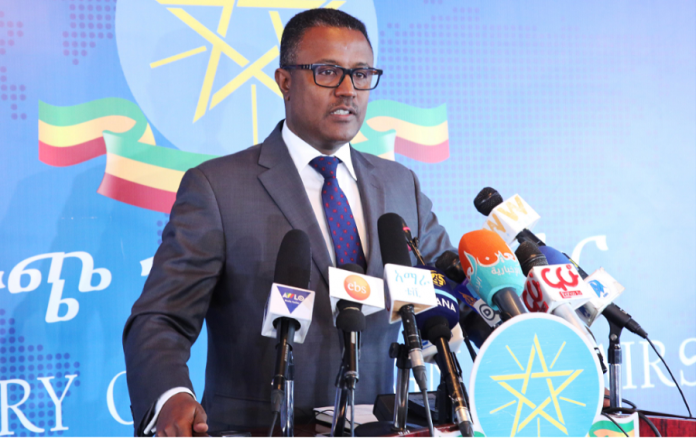
Ethiopia has finalized preparations and is ready to host the 33rd Ordinary Session of the Assembly of Heads of State and Government of the African Union (AU) which will be held from January 21 to February 10, 2020.
Briefing journalists today, Foreign Affairs Spokesperson, Nebiat Getachew said national committees were established with sub-committees from pertinent stakeholders in carrying out the preparation.
The 33rd AU Summit will be convened at the Headquarters in Addis Ababa under the theme “Silencing the Guns: Creating Conducive Conditions for Africa’s Development”.
Ethiopia had extended its support to Africans during the fight against colonialism, Nebiat said, adding that “it remains committed in fostering the continental integration based on mutual benefit.”
According to the Spokesperson, issuance of visa on arrival, its commitment in the African Continental Free Trade Agreement (AfCFTA), bilateral and multilateral cooperation are testimonies of its strong African spirit.
Thus, the 39th Ordinary Session of the Permanent Representatives’ Committee (PRC) will be held from January 21 to 22, 2020, while 36th the Ordinary Session of the Executive Council (Ministerial) and Ordinary Session of the Assembly of the Heads of State and Government will be held from February 6 to 7 and 9 to 10 respectively.
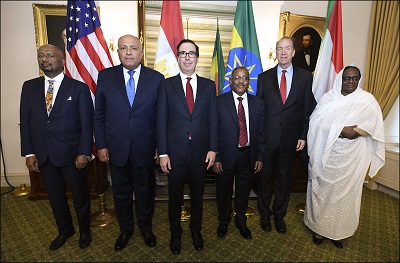

The Ministers of Foreign Affairs and Water Resources of Egypt, Ethiopia and Sudan and their delegations met with the Secretary of the Treasury and the President of the World Bank, participating as observers, in Washington, D.C. on January 13-15, 2020. The Ministers noted the progress achieved in the four technical meetings among the Ministers of Water Resources and their two prior meetings in Washington D.C. and the outcomes of those meetings and their joint commitment to reach a comprehensive, cooperative, adaptive, sustainable, and mutually beneficial agreement on the filling and operation of the Grand Ethiopian Renaissance Dam.
Toward that end, the Ministers noted the following points, recognizing that all points are subject to final agreement:
The Ministers agree that there is a shared responsibility of the three countries in managing drought and prolonged drought.
The Ministers agreed to meet again in Washington, D.C. on January 28-29 to finalize a comprehensive agreement on the filling and operation of the GERD, and that there will be technical and legal discussions in the interim period.
The Ministers recognize the significant regional benefits that can result from concluding an agreement on the Grand Ethiopian Renaissance Dam with respect to transboundary cooperation, regional development and economic integration that can result from the operation of the Grand Ethiopian Renaissance Dam. The Ministers of Foreign Affairs reaffirmed the importance of transboundary cooperation in the development of the Blue Nile to improve the lives of the people of Egypt, Ethiopia, and Sudan, and their shared commitment to concluding an agreement.
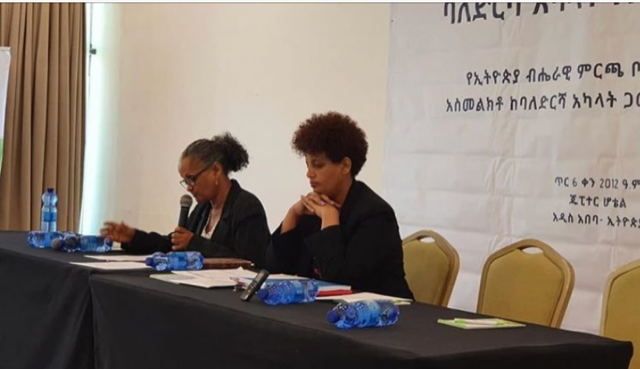
The National Electoral Board of Ethiopia (NEBE) will announce schedule for Ethiopia’s forthcoming general elections today (January 15th).
The electoral board is currently deliberating on the draft timetable with stakeholders at Jupiter hotel.
According to the draft schedule tabled by NEBE, registration of voters will take place from April 7 – May 7, 2020.
The Board suggested August 16, 2020 as a tentative date for the voting process.
It was noted that the draft electoral schedule was prepared based on the Constitution
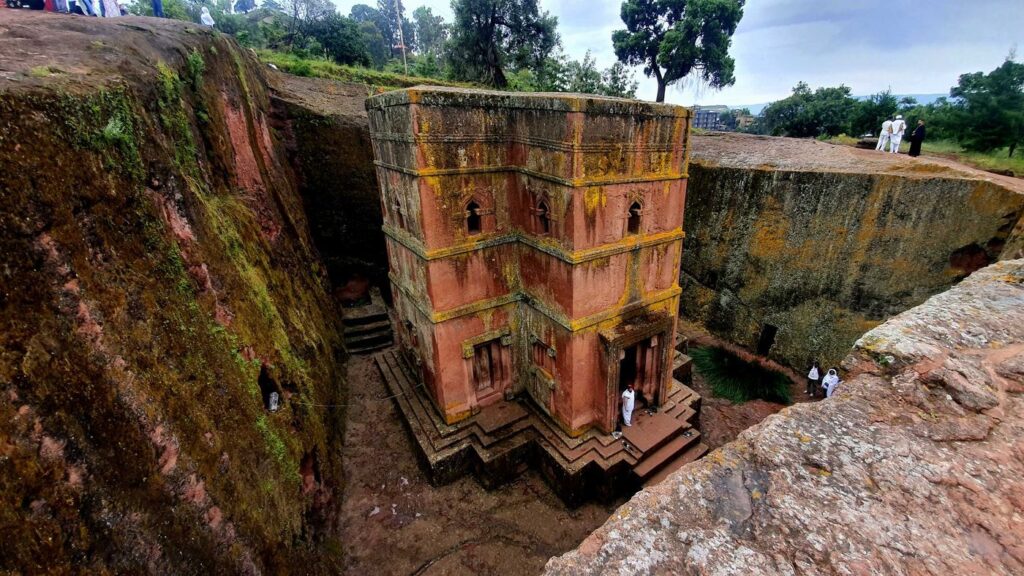
In listing “the 24 destinations that will be especially hot this year” Bloomberg has published the following:
“The first step to getting on travelers’ bucket lists is to have a tourism ministry that cares, and few care like Ethiopia’s. In 2015 it set out to make the country a top-five African destination by 2020; in 2018 tourism grew 48.6% from the previous year, faster than any other country. Its formula is a mix of history (the rock-hewn churches of Lalibela), cultural experiences with the tribes of the Omo Valley, and wildlife viewing in the Bale and Simien mountains. Plus, Ethiopian Airlines is offering new routes from Houston and Chicago, and …,” please read the whole story here: https://bloom.bg/2RjIyaC

President of the International Committee of the Red Cross (ICRC), Peter Maurer, arrived Sunday January 12th in Addis Ababa to pay a three-day official visit to Ethiopia.
During his stay in Ethiopia, Maurer is expected to meet and hold discussions with President Sahlework Zewdie, who is also the Patron of Ethiopian Red Cross Society, and senior officials of the African Union (AU).
In his meeting with President Sahlework, Maurer will explore ways to enhance humanitarian activities in Ethiopia and deepen partnerships with the country.
He will also visit Somali Regional State to oversee ICRC’s operations in the region.
The International Committee of the Red Cross works with the Ethiopia Red Cross Society to dispense emergency relief items to the displaced, provide potable water, and reconnect separated family members.
The ICRC also works in places of detention to improve living conditions and promote humane treatment of detainees on the top of providing physical rehabilitation services for people living with disabilities.
The ICRC has also a separate delegation in Addis Ababa dedicated entirely to the African Union.


1. At the invitation of President Matamela Cyril Ramaphosa, the Prime Minister of the Federal Democratic Republic of Ethiopia, H.E. Dr. Abiy Ahmed Ali, paid an Official Visit to the Republic of South Africa from 11 to 12 January 2020, which is the first state level exchange of visits between the two countries. Prime Minister Abiy Ahmed, who undertook his first Official Visit to South Africa, was also a Guest at the 108th Anniversary of the founding of the African National Congress, on 11 January 2020.
2. President Ramaphosa was accompanied by the Minister of International Relations and Cooperation; the Minister of Agriculture, Land Reform and Rural Development; the Minister of State Security; the Minister of Home Affairs; the Minister of Trade, Industry and Competition; the Minister of Higher Education, Science and Technology, and for the signing ceremony, the Minister of Health and the Minister of Tourism. Prime Minister Abiy Ahmed was accompanied by the Minister of Social and Labour Affairs, the Minister of Mines and Petroleum and the State Minister of Foreign Affairs.
3. Prime Minister Abiy Ahmed and President Ramaphosa held Official level talks in Pretoria on January 12, 2020. Discussions were held in the spirit of friendship and the historical links between the two countries. Both leaders acknowledged the importance of the visit to South Africa.
4. The two Leaders recalled the deep rooted historical links and friendship that have been forged over many years during the struggle for freedom and equality against colonialism and apartheid and expressed their satisfaction at the deepening and widening of the bilateral partnership.
5. President Ramaphosa and Prime Minister Abiy witnessed the signing of an agreement and two memoranda of understanding. The Agreement on the Waiver of Visa Requirements for Holders of Diplomatic or Official/Service Passports is expected to ease the travel of officials, which will contribute to further strengthening the bilateral relations.
6. The Memorandum of Understanding on Cooperation in the field of Tourism will be important to both countries in the creation of employment opportunities, especially for the youth. The Memorandum on Cooperation in the field of Health will be important in providing high quality health services for the citizens of their respective countries, especially the young and the elderly.
7. The Principals welcomed the presence of South African companies and business entities in Ethiopia, including investment and trade links, and it was agreed to enhance bilateral investments between the two countries, and at the same time affirmed their commitment to expanding cooperation in trade and investment between business entities in South Africa and Ethiopia, as well as agreeing to cooperate in the field of Small and Medium Enterprises (SMEs) due to their important role in job creation. There was also agreement to strengthen cooperation in the area of mining, deep mining and mineral beneficiation, to strengthen agricultural cooperation so as to enhance food security, and to work towards addressing skills development through the exchange of best practices, among others.
8. The two Leaders took note of the status of bilateral relations to date as well as previously signed Agreements and MoUs which include, among others, the avoidance of double taxation, defence cooperation, industrial and technical cooperation, a bilateral air services agreement, and cooperation in agriculture. The Leaders agreed that the time had arrived to elevate the bilateral cooperation to a strategic partnership. President Ramaphosa and Prime Minister Abiy Ahmed Ali also requested the respective Foreign Ministers to take this process forward and to ensure the implementation of all the bilateral Agreements and Memoranda of Understanding.
9. Both Leaders agreed that the next Session of the South Africa-Ethiopia Joint Ministerial Commission (JMC) would be held in 2020, in Addis Ababa, led by the Foreign Ministers.
10. President Ramaphosa and Prime Minister Abiy discussed the issue of Ethiopians residing in South Africa and agreed that the two countries need to cooperate on this matter. The two Leaders further agreed on the need for both countries to work together to address illegal migration, human trafficking, and smuggling.
11. At the continental level, the two leaders discussed South Africa’s upcoming Chairship of the African Union under the approved theme: “Silencing the Guns: Creating Conducive Conditions for Africa’s Development.” The two leaders underscored the importance of achieving the objective of Silencing the Guns in order to create the necessary conditions for Africa’s development.
12. Both Leaders reiterated that the socio-economic development of the Continent, and the realization of a prosperous Africa based on inclusive growth and sustainable development, remains a central objective of the African Union, as espoused in Agenda 2063.
13. At the global level, the leaders underscored the need for continuing consultations in order to build partnerships in multilateral fora and to ensure that the agenda of the South is prioritized. The two leaders further emphasized the need for the reform of the UN and its multilateral organizations and undertook to enhance cooperation and coordination in this regard.
14. They also recognised South Africa’s contribution to uphold Africa’s position as a non-permanent member of the UN Security Council. They reaffirmed their commitment to enhance the voice and representation of emerging and developing economies, including those in Africa, in the decision-making bodies of multilateral institutions, and further called for enhanced regional cooperation.
15. President Ramaphosa and Prime Minister Abiy Ahmed Ali agreed that terrorism constitutes a serious threat to international peace, security and stability and that no country is immune to the threat that terrorism represents. They noted the need for concerted action by the global community against terrorism through early agreement and adoption of the UN Comprehensive Convention on International Terrorism, as well as the implementation of the United Nations Global Counter-Terrorism Strategy in a balanced and integrated manner. They also condemned terrorism in all its forms and manifestations regardless of its motivations, whenever, wherever and by whosoever committed.
16. Prime Minister Abiy Ahmed Ali expressed his gratitude to the Government and People of South Africa for the warm and generous hospitality extended to him and his delegation during the visit, and extended an invitation to President Ramaphosa to pay a reciprocal State Visit to Ethiopia on mutually convenient dates.
You may follow it using the link below
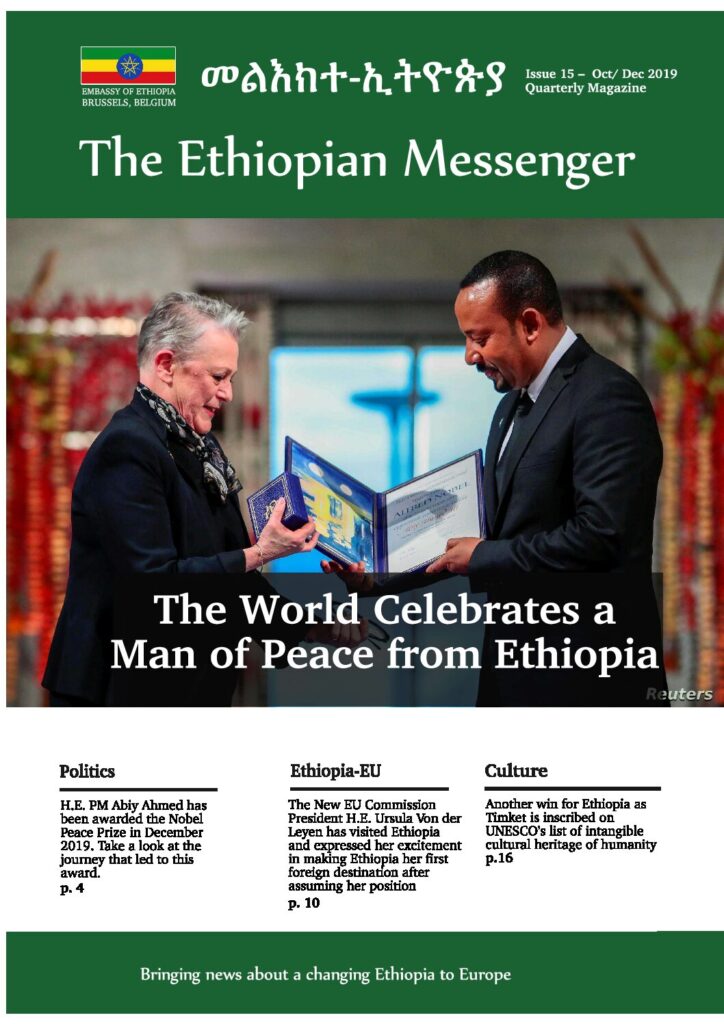
The latest issue of the Embassy’s Magazine, The Ethiopian Messenger, is available here : The Ethiopian Messenger 15!
Content:
The World Celebrates a Man of Peace from Ethiopia
The genesis and current status of the trilateral discussions on GERD
Ethiopia, EU eyeing towards a greater partnership
Homegrown Economic Reform Agenda and the Plan of Action for Job Creation in Ethiopia
Investing in Ethiopia: A Private Equity Perspective
TIMKET inscribed on UNESCO’s list of Intangible Cultural Heritage of Humanity
A Palace Turns to Tourist Attraction Site – Unity Park
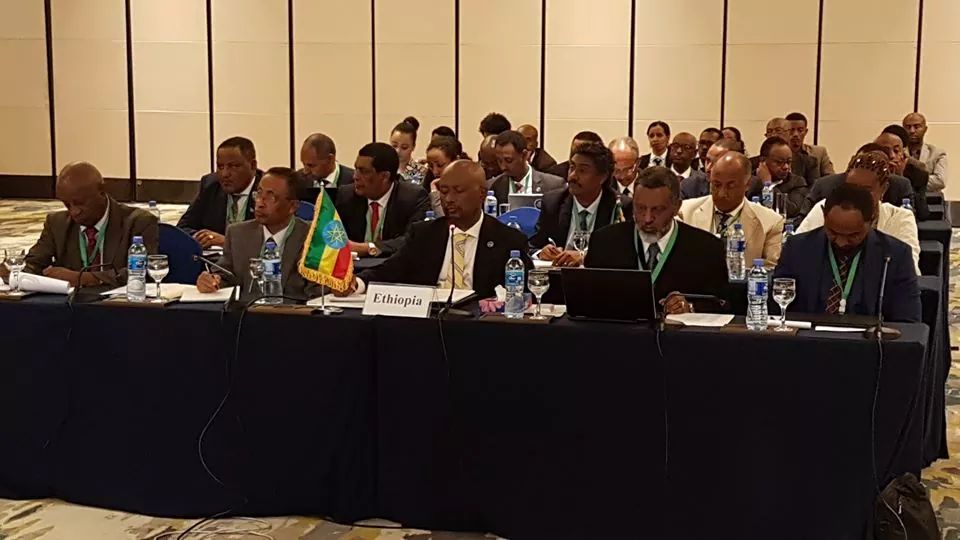
The Trilateral Ministerial Technical meeting of the Ministers of Water Affairs of Ethiopia, Egypt and Sudan on GERD is concluded today (9 January 2020).
The trilateral Ministers of Water Affairs on the filling and operation of the GERD convened for the fourth time since the meeting held in Washington DC on 06 November 2019.
The Ministerial technical meeting is held as per the direction of the heads of governments of the three countries in their meeting in Addis Ababa on 10 February 2019 for the Ministers of Water Affairs to hold technical discussions and come up with scenarios on the filling and operation of the GERD.
The meeting was also attended by the observers
Although the meeting was expected to be concluded by reaching an understanding on outstanding issues relating to filling and operation of the GERD, including on the volume of minimum release from GERD and cooperation during drought and prolonged drought, an agreement is not reached on any of the issues.
Ethiopia has proposed a filling plan that is stage-based and will take from 4 – 7 years depending on the inflow at the GERD.
It also proposed to take mitigation measures in the incidence of drought or prolonged drought during filling and operation of the Dam.
These proposals allow the prevention of significant harm on the downstream countries and have taken into account the proposals of Egypt and Sudan.
However, the insistence by the delegation of Egypt to have its entire proposal accepted has prohibited reaching an agreement.
At the meeting, Egypt presented its own version of a filling plan.
Egypt’s proposal will make the Dam be filled in 12 – 21 years’ time and obliges Ethiopia to compensate the “cumulative deficit” for the water it uses for Dam filling.
However, considering Ethiopia applies drought mitigation strategies at all stages of filling, the concept of “cumulative deficit” does not exist.
Egypt’s proposal also assumes natural flow on the Blue Nile River, which zeroes all abstractions including the existing water development projects Ethiopia built for the past 50 years on the Blue Nile.
This is tantamount to denying Ethiopia`s not only future but also existing rights to use its Nile Waters.
Whereas, Ethiopia posited the justified position that the filling and operation will be based on the inflow at GERD site.
The principle of natural flow is non-cooperative and deprives Ethiopia of its just and sovereign right to use its natural resource.
Egypt’s proposal reinforces the country`s self-claimed sole ownership of the Nile waters that Egypt seeks to preserve.
This inflexible position contravenes the principles of equitable and reasonable utilization and lacks spirit of cooperation.
These fundamental principles together with the obligation not to cause significant harm are enshrined under the Declaration of Principles (DoP) that the three Countries have signed in March 2015.
As using the Nile is a matter of survival for Ethiopia, it will continue its efforts to preserve its rights to use the water to meet the needs of its existing and future generations.
Ethiopia rejects any direct or indirect attempt to make it accept unjust and inequitable colonial or other “treaties” in which it is not a Party and that allocates zero water out of its contribution of 77Billion Cubic meters.
In its engagements with Egypt and Sudan, Ethiopia will continue its effort based on brotherhood, good faith, and cooperation to make the GERD an example for cooperation and integrated development.
All matters relating to filling and operation of the GERD are sufficiently discussed based on scientific evidence.
The Countries have convergence on considerable number of technical issues on filling and operation of the Dam.
Ethiopia is of the view that the ministerial technical meetings demonstrated the actual opportunity for reaching an agreement among the countries themselves if all the countries acted in good faith and spirit of cooperation.
In the next step, the water Affairs Ministers will report to the Heads of Governments of the three countries that will give direction on the way forward.
On 13 January 2020 the Foreign Affairs and Water Affairs Ministers of the three Countries will meet in Washington.
The meeting will be an opportunity to review progress of the technical discussion.